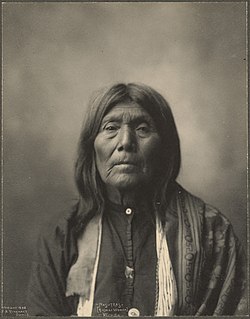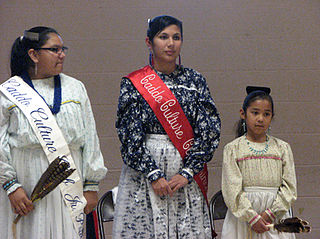
The Caddo people comprise the Caddo Nation of Oklahoma, a federally recognized tribe headquartered in Binger, Oklahoma. They speak the Caddo language.

The Caddoan languages are a family of languages native to the Great Plains spoken by tribal groups of the central United States, from present-day North Dakota south to Oklahoma. All Caddoan languages are critically endangered, as the number of speakers has declined markedly due to colonial legacy, lack of support, and other factors.

The Wichita people, or Kitikiti'sh, are a confederation of Southern Plains Native American tribes. Historically they spoke the Wichita language and Kichai language, both Caddoan languages. They are indigenous to Oklahoma, Texas, and Kansas.

Caddo is a Native American language, the traditional language of the Caddo Nation. It is critically endangered, with no exclusively Caddo-speaking community and as of 2023 only two speakers who had acquired the language as children outside school instruction, down from 25 speakers in 1997. Caddo has several mutually intelligible dialects. The most commonly used dialects are Hasinai and Hainai; others include Kadohadacho, Natchitoches and Yatasi.
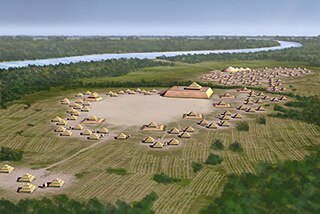
Spiro Mounds is an Indigenous archaeological site located in present-day eastern Oklahoma. The site was built by people from the Arkansas Valley Caddoan culture. that remains from an American Indian culture that was part of the major northern Caddoan Mississippian culture. The 80-acre site is located within a floodplain on the southern side of the Arkansas River. The modern town of Spiro developed approximately seven miles to the south.
The Kitsailanguage is an extinct member of the Caddoan language family. The French first record the Kichai people's presence along the upper Red River in 1701. By the 1840s Kitsai was spoken in southern Oklahoma, but by the 1930s no native speakers remained. It is thought to be most closely related to Pawnee. The Kichai people today are enrolled in the Wichita and Affiliated Tribes, Waco and Tawakonie), headquartered in Anadarko, Oklahoma.

The Tawakoni are a Southern Plains Native American tribe, closely related to the Wichitas. They historically spoke a Wichita language of the Caddoan language family. Currently, they are enrolled in the Wichita and Affiliated Tribes, a federally recognized tribe.
The Nasoni are a Native American tribe from eastern Texas and southwestern Arkansas.
The Kadohadacho are a Native American tribe within the Caddo Confederacy. Today they are enrolled in the Caddo Nation of Oklahoma.
The Yatasi were Native American peoples from northwestern Louisiana that were part of the Natchitoches Confederacy of the Caddo Nation. Today they are enrolled in the Caddo Nation of Oklahoma.
The Eyeish were a Native American tribe from present-day eastern Texas.
The Nadaco, also commonly known as the Anduico, are a Native American tribe from eastern Texas. Their name, Nadá-kuh, means "bumblebee place."
The Nabiti are a Native American tribe from eastern Texas. Their name means "Cedar Place" in the Caddo language.
The Nechaui were a Native American tribe from eastern Texas. Their name is thought to be derived from Nachawi, the Caddo language word for Osage orange.
The Ouachita are a Native American tribe who lived in northeastern Louisiana along the Ouachita River. Their name has also been pronounced as Washita by English speakers. The spelling "Ouachita" and pronunciation "Wah-sha-taw" came about as a result of French settlers and their influence. Many landscape features and places have been named for them since colonization of the region by Europeans and Americans.
The Nabedache were a Native American tribe from eastern Texas. Their name, Nabáydácu, means "blackberry place" in the Caddo language. An alternate theory says their original name was Wawadishe from the Caddo word, witish, meaning "salt."
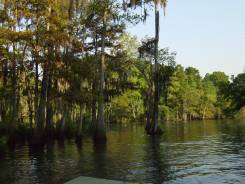
The Nacogdoche are a Native American tribe from eastern Texas.
The Neche were a Native American tribe from eastern Texas.
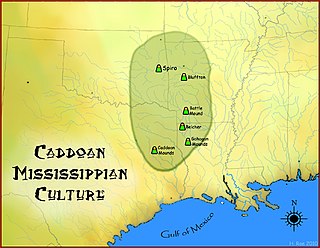
The Caddoan Mississippian culture was a prehistoric Native American culture considered by archaeologists as a variant of the Mississippian culture. The Caddoan Mississippians covered a large territory, including what is now Eastern Oklahoma, Western Arkansas, Northeast Texas, Southwest Missouri and Northwest Louisiana of the United States.

The Waco of the Wichita people are a Southern Plains Native American tribe that inhabited northeastern Texas. Today, they are enrolled members of the federally recognized Wichita and Affiliated Tribes, headquartered in Anadarko, Oklahoma.
